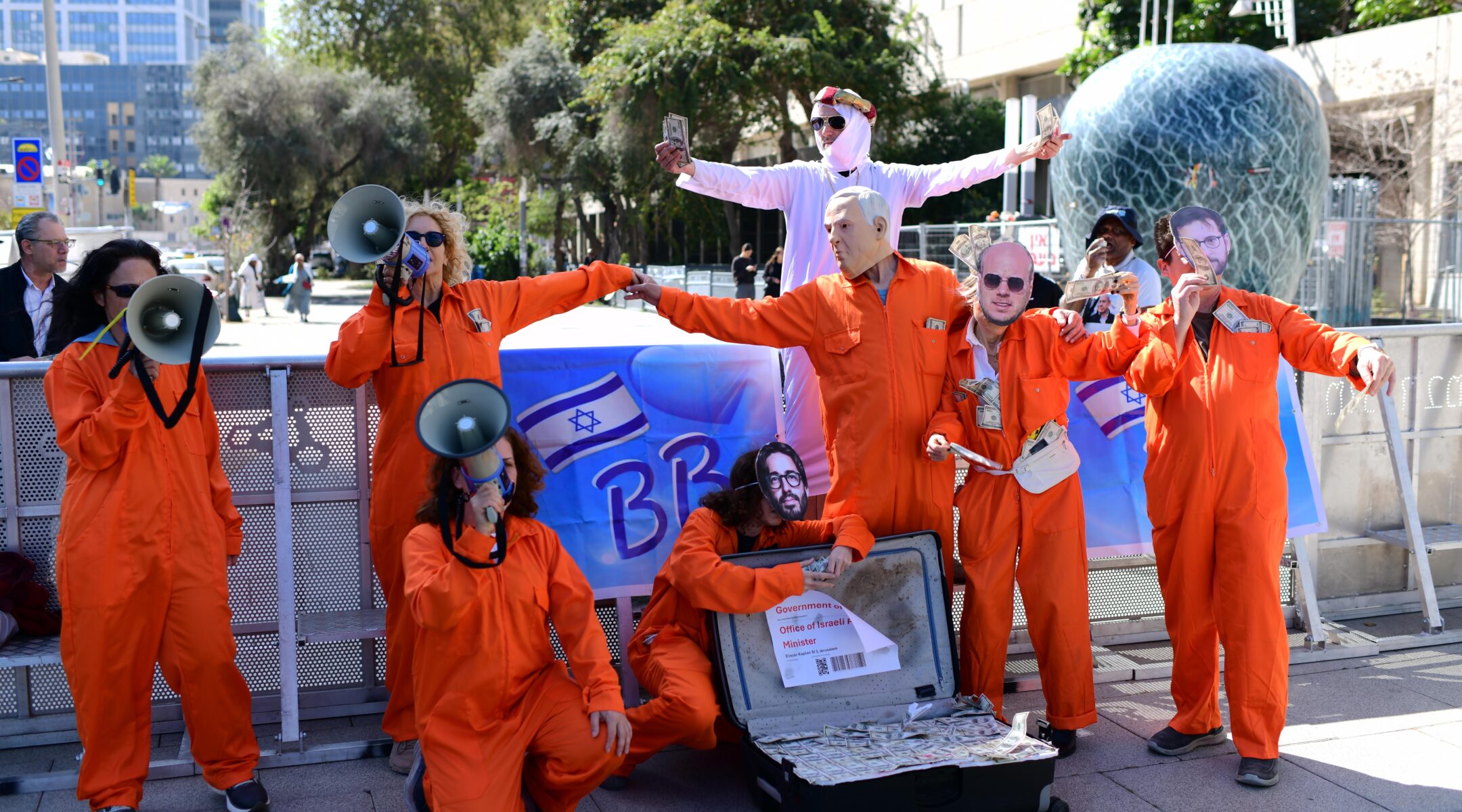Not one but many interconnected scandals involving Israeli Prime Minister Benjamin Netanyahu are roiling the country right now.
They span everything from Israel’s courts to its intelligence agencies to suspicions of a Qatari plot. Police have questioned Netanyahu, two of his aides have been arrested and protests against him are still filling the streets. This week, the editor of the Jerusalem Post was also brought in for questioning.
And that’s beside ongoing debates over the Gaza war and the hostages held by Hamas.
Israeli news is often hectic and confusing. But if this week feels especially dizzying to you, you’re not alone. On Tuesday, the banner headline on one of Israel’s most-read papers blared, simply, “National Vertigo.”
What are these scandals? Are they interconnected? What do they mean for the war and the hostages in Gaza? Will Netanyahu keep his job? And what does Lindsey Graham have to do with all of this?
We explain it all here.
Why is Netanyahu’s office being investigated over Qatar?
The scandal lighting up Israel, more than any other, is known locally as “Qatar-gate.” (Yes, that’s what it’s called in Hebrew, too.) The short version of the story goes something like this:
Eli Feldstein was hired after Hamas’ Oct. 7, 2023, attack as a spokesman for Netanyahu. At the very same time, allegedly, Feldstein was also being paid to represent the Qatari government — a longtime funder of Hamas — and to push Qatari messaging to Israeli journalists.
The man who oversaw Feldstein, longtime Netanyahu adviser Yonatan Urich, faces similar allegations. This week, another accusation surfaced: that Urich sent Qatari talking points as statements from Netanyahu’s office.
Both Feldstein and Urich have been arrested, and the investigation’s net has ensnared more people: Jay Footlik, a former Democratic adviser, reportedly arranged the Qatari payments to Feldstein.
On Tuesday, it emerged that Jerusalem Post editor-in-chief Zvika Klein was also being questioned under caution in the probe. Klein visited Qatar one year ago at the country’s invitation and spoke with senior officials there; he wrote that his trip there “reveals a nation striving for a larger purpose on the world stage.”
Israeli media had reported that Feldstein invited Klein to Qatar. In February, Klein denied that claim in a post on X, writing, “The truth is I have never met Feldstein” and that he spoke with Feldstein on the phone only following the Qatar visit.
He added, “The Qatari government is the one that contacted us, the Jerusalem Post — because they knew that we’re a balanced and influential publication that is read both among government officials and influential American Jews — as do many other countries, and we have no need for intermediaries.
One day earlier, Netanyahu himself was questioned. He has denied wrongdoing and said the investigation is politically motivated.
Isn’t Netanyahu embroiled in a lot of allegations? Why is this one blowing up?
Yes, Netanyahu has been on trial for corruption for years, in a series of cases that once scandalized Israel but have received relatively less attention recently in the country’s media and protests.
The Qatar scandal is different.
Qatar has funded Hamas and hosts Hamas’ leadership, who continued to use it as a home base after the terror group’s Oct. 7, 2023, attack. Qatar is also one of the countries mediating negotiations over the Israeli hostages Hamas is holding.
All of that makes Qatar something of an adversary to Israel — and key to the Israeli national interest. While some Israeli politicians have praised Qatar as a go-between, others have condemned it as a sponsor of terror.
It’s also far from the first example of Qatar using its billions to burnish its image internationally — whether by funding American universities, inviting their satellite campuses to its own soil, or hosting the World Cup in 2022. Those initiatives have invited scrutiny and criticism — and played into one of Qatar’s long-standing aims: For years, the oil-rich Gulf state has sought to establish itself as an indispensable bridge-builder and mediator in a fraught and violent region.
“Qatari money is like fingerprints that appear when an ultraviolet light turns on,” the Israeli journalist Matti Friedman wrote this week. He added, “But few suspected that the ultraviolet light would turn up a new fingerprint — in Israel itself.”
The concern is that if the prime minister’s aides are secretly working for the country that houses Hamas’ leaders, that may not bode well for Israeli security. Another twist: Amit Hadad, the lawyer representing Urich, also has another client: Netanyahu.
Will the investigation implicate Netanyahu? What’s he saying about it?
The prime minister has not been charged in Qatar-gate, but he was brought in for hours of questioning on Monday.
As in his corruption cases, the prime minister is denying any wrongdoing — and isn’t holding back. In a video on Monday, he called Feldstein and Urich “hostages” — a loaded term in Israel.
He claimed that the entire investigation is a ploy to take down his government.
“After an hour, they were out of questions,” he said of the police. “I said, ‘Show me materials, show me something.’ They had nothing to show. I was astounded. I knew this was a politically motivated investigation, but I didn’t understand to what extent. And they’re holding Yonatan Urich and Eli Feldstein, simply, as hostages.”
The comment raised eyebrows in Israel. “He knows no bottom,” tweeted liberal activist Yaya Fink, one of the prime minister’s longtime critics. “The only hostages are our 59 brothers and sisters who are abandoned in Hamas captivity.”
What does this have to do with Netanyahu firing the intelligence chief?
It depends who you ask. When Netanyahu announced two weeks ago that he would fire Ronen Bar, the head of the Shin Bet, Israel’s domestic intelligence agency, he said it was because he had “a continuing lack of confidence” in him — not because of the Qatar probe.
It is true that Netanyahu and Bar have reportedly clashed time and time again over the hostage negotiations. But given the timing of the decision, shortly after news of the Qatar investigation broke, Netanyahu’s critics alleged an ulterior motive.
“Netanyahu is firing Ronen Bar for only one reason — the ‘Qatar-gate’ investigation,” Israeli opposition leader Yair Lapid said on the same day as Netanyahu’s announcement. “For a year and a half, he saw no reason to fire him, but only when the investigation into Qatar’s infiltration of Netanyahu’s office and the funds transferred to his closest aides began did he suddenly feel an urgency to fire him immediately.”
A chunk of Israelis at large are sympathetic to that claim: Although Bar, who was in his position on Oct. 7, 2023, is unpopular, a poll found that about half of respondents say Netanyahu fired Bar over “Qatar-gate” — not because of his job performance. About a third said the decision was a result of Oct. 7.
The Supreme Court has frozen the termination until a hearing next week out of fear that the move was illegal. That fear succeeded an opinion by Israel’s attorney general, Gali Baharav-Miara — whom Netanyahu’s government is also pushing to fire.
Will Netanyahu obey the court?
That’s the question on everyone’s mind — and it depends in part on whether the court upholds the firing or strikes it down. But in the meantime, Netanyahu insists that he has the right to choose his own officials — and he’s forging ahead, with mixed results.
On Monday, he announced that Eli Sharvit, a vice admiral in Israel’s navy, would be the next Shin Bet chief. The appointment earned praise even from some Netanyahu critics, who praised Sharvit’s professionalism.
But then, one day later, Netanyahu flipped, and pulled Sharvit’s nomination. That about-face came after Netanyahu allies protested that Sharvit had opposed another Netanyahu effort — his quest to weaken the judiciary.
This is also where Lindsey Graham comes in. The Republican senator also objected to Sharvit — because the navy man recently wrote an op-ed, in Hebrew, criticizing President Donald Trump’s climate policy.
“While it is undeniably true that America has no better friend than Israel, the appointment of Eli Sharvit to be the new leader of the Shin Bet is beyond problematic,” Graham wrote. “There has never been a better supporter for the State of Israel than President Trump. The statements made by Eli Sharvit about President Trump and his policies will create unnecessary stress at a critical time.”
Netanyahu announced Wednesday that the Shin Bet’s deputy head would be its interim leader.
Is that why Israelis are protesting?
The short answer is yes. The long answer is yes — and they’re protesting other things, too.
Protesters massing outside Netanyahu’s Jerusalem residence have highlighted the Qatar scandal and opposed the firing of Bar. They’re also protesting other Netanyahu decisions that, they say, endanger Israel.
Antigovernment protests have been taking place for years in Israel for a variety of reasons, but they escalated two weeks ago when Netanyahu decided to end the ceasefire in Gaza and resume the war against Hamas, which recently intensified. Netanyahu said the new offensive is necessary to depose the terror group from Gaza. Protesters say it promises more war that will only endanger the hostages — instead of negotiating to bring them home.
Days later, another issue animated the protesters: A renewed, successful legislative push to enact a piece of Netanyahu’s long-desired judicial overhaul. Last week, the government passed a bill increasing politicians’ influence in selecting Supreme Court judges. Proponents of the move say it will make the court more responsive to the country. Opponents say it will politicize a previously professional system.
Whatever the issue at hand, the protests have been far from calm. The police, who are controlled by far-right National Security Minister Itamar Ben-Gvir, have clashed with protesters. On Monday, two policemen were filmed grabbing left-wing lawmaker Naama Lazimi by the arms and manhandling her at a protest as she screamed.
Will Netanyahu survive this scandal?
For now, yes. Despite the demonstrations, his parliamentary majority looks solid — and as long as he has a majority, he can stay in office. His government just passed a budget, which enables it to last until the next election, which is set to take place in late 2026.
Netanyahu is not popular: 70% of Israelis want him to resign, either right now or after the war ends. Most surveys show he’d lose a close election if one were held today. But his poll numbers have improved since Oct. 7, and he’s escaped from political peril many times before.
Still, challengers are girding themselves. Former Prime Minister Naftali Bennett, a former ally who was key to unseating Netanyahu in 2021, just announced that he was reentering politics.
JTA has documented Jewish history in real-time for over a century. Keep our journalism strong by joining us in supporting independent, award-winning reporting.





